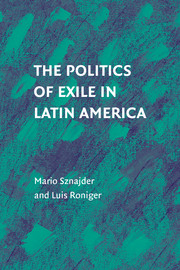Book contents
- Frontmatter
- Contents
- Acknowledgments
- List of Acronyms
- Introduction: The Politics of Exile
- 1 Defining the Exilic Condition
- 2 Forceful Displacement, the Construction of Collective Identities, and State Formation
- 3 The Format of Early Exile
- 4 Sites of Exile
- 5 Widening Exclusion and the Four-Tiered Structure of Exile
- 6 Exile Communities, Activism, and Politics
- 7 Presidents in Exile
- 8 Is Return the End of Exile?
- Bibliography
- Index
- References
2 - Forceful Displacement, the Construction of Collective Identities, and State Formation
Published online by Cambridge University Press: 28 July 2009
- Frontmatter
- Contents
- Acknowledgments
- List of Acronyms
- Introduction: The Politics of Exile
- 1 Defining the Exilic Condition
- 2 Forceful Displacement, the Construction of Collective Identities, and State Formation
- 3 The Format of Early Exile
- 4 Sites of Exile
- 5 Widening Exclusion and the Four-Tiered Structure of Exile
- 6 Exile Communities, Activism, and Politics
- 7 Presidents in Exile
- 8 Is Return the End of Exile?
- Bibliography
- Index
- References
Summary
I beg you to order the implementation of my departure outside Colombia, since once far away from the country, I will no longer belong to factions and only live in peace and my name will not serve as a pretext to hamper public order.
Francisco de Paula Santander to Simón Bolívar, 1828Expulsion from the realm was a major instrument of imperial policy-making in Iberia, as elsewhere. The forceful and massive expulsion of the Jews in the 1490s and of the Iberian Moslems in the early 16th century, as well as the slave trade among Africa, Europe, and America as a perverse way of massive relocation of populations for economic profit, are salient cases. They were supplemented on a piecemeal level by the threat and use of displacement as a mechanism of regulation and control of subjects. In this chapter, we elaborate on the early forms of forceful displacement and discuss their intended and unintended consequences on the construction of collective identities and state formation, showing lines of continuity and change once the region underwent a major political transformation in the early 19th century.
Banishment as a Portuguese Colonial Practice
A tradition of degredo [exile or territorial banishment], implying institutional exclusion, had existed in Portugal since the Middle Ages. It was used by power-holders to get rid of criminals and undesirables by sending them to the borders of the kingdom while Portugal was involved in regional wars.
- Type
- Chapter
- Information
- The Politics of Exile in Latin America , pp. 40 - 72Publisher: Cambridge University PressPrint publication year: 2009



